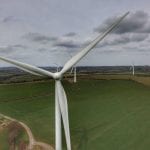Around The Web
Essay competition targets energy fairness and savings
 Young Australian writers are invited to share their insights about fairness and efficiency in the energy sector for a share of $5000 in prizes.
Young Australian writers are invited to share their insights about fairness and efficiency in the energy sector for a share of $5000 in prizes.
The post Essay competition targets energy fairness and savings appeared first on RenewEconomy.
Australia could be 100% renewable by 2030s, meet Paris targets by 2025
 ANU study says current pace of solar and wind deployment in Australia could deliver equivalent of 100% renewables by early 2030s, and achieve emissions reduction task “for whole economy” by 2025.
ANU study says current pace of solar and wind deployment in Australia could deliver equivalent of 100% renewables by early 2030s, and achieve emissions reduction task “for whole economy” by 2025.
The post Australia could be 100% renewable by 2030s, meet Paris targets by 2025 appeared first on RenewEconomy.
Is hands-free electric vehicle DC fast-charging a thing?
 Not quite yet, but there are a number of people – and companies – working on it and testing prototypes.
Not quite yet, but there are a number of people – and companies – working on it and testing prototypes.
The post Is hands-free electric vehicle DC fast-charging a thing? appeared first on RenewEconomy.
Entura appointed owner’s engineer for Kidston dispatchable renewables hub
 Specialist power and water consulting firm Entura has been engaged by Genex Power to deliver Owner’s Engineer services for Stage 2 of the 250 MW Kidston Pumped Storage Hydro Project and the 270 MW Kidston Solar Project.
Specialist power and water consulting firm Entura has been engaged by Genex Power to deliver Owner’s Engineer services for Stage 2 of the 250 MW Kidston Pumped Storage Hydro Project and the 270 MW Kidston Solar Project.
The post Entura appointed owner’s engineer for Kidston dispatchable renewables hub appeared first on RenewEconomy.
The Driven Podcast: Chief scientist Alan Finkel on battery EVs and fuel cell EVs
 Chief scientist Alan Finkel shares his love of electric vehicles, his charging needs, his views on autonomous driving and the prospects of fuel cell electric vehicles.
Chief scientist Alan Finkel shares his love of electric vehicles, his charging needs, his views on autonomous driving and the prospects of fuel cell electric vehicles.
The post The Driven Podcast: Chief scientist Alan Finkel on battery EVs and fuel cell EVs appeared first on RenewEconomy.
NT airports to get three new solar farms and battery storage, courtesy of Canavan’s NAIF
 A NAIF loan of $150m will help add more than 50MW of solar PV and one battery storage system to airports in the Northern Territory.
A NAIF loan of $150m will help add more than 50MW of solar PV and one battery storage system to airports in the Northern Territory.
The post NT airports to get three new solar farms and battery storage, courtesy of Canavan’s NAIF appeared first on RenewEconomy.
Australia has a new carbon neutral precinct
Lack of climate policy threatens to trip up Australian diplomacy this summit season
London councils accused of holding up rollout of electric car charging points
Energy company SSE claims thousands of new points are in bureaucratic limbo
Britain has thousands fewer electric car charging points than required because councils are frustrating their rollout, according to one of the country’s biggest energy companies.
Big six energy firm SSE said that when it started work three years ago, it had hoped to install 6,000 charging points in London by now, but had fitted just 762 because of delays by local authorities.
Continue reading...Nations seek stripped-down Paris rulebook as work piles up
Green number plates ‘could boost sales of electric cars’ in UK
Electric and other ultra-low emission cars, vans and taxis could be given special green number plates to boost awareness and increase the use of environmentally “clean” driving.
Green plates are already used in Norway, Canada and China on green vehicles including electric and hydrogen cars, making them both distinct and visible to other road others.
Continue reading...Sonnen to manufacture home batteries at old Holden factory in Adelaide
 A day after SA government announces scheme to subsidise home battery storage, Germany's sonnen confirms plans to manufacture 10,000 batteries a year at old Holden site.
A day after SA government announces scheme to subsidise home battery storage, Germany's sonnen confirms plans to manufacture 10,000 batteries a year at old Holden site.
The post Sonnen to manufacture home batteries at old Holden factory in Adelaide appeared first on RenewEconomy.
Red Marauder - A history of drought in Australia
Rise for Climate: thousands to march across US to protest environment crisis
Protests will be spearheaded by march in San Francisco on Saturday ahead of a climate change summit in the city next week
Tens of thousands of people are set to take part in marches and other events across the US on Saturday, to call for a swift transition to renewable energy in order to stave off the various perils of climate change.
The Rise for Climate protests will be spearheaded by a march in San Francisco, ahead of a climate change summit in the city next week that will gather mayors and business leaders from around the world.
Continue reading...Scientists get ready to begin Great Pacific Garbage Patch cleanup
Ambitious project will involve a massive floating barrier that aims to collect up to five tonnes of plastics every month
A team of scientists and engineers will on Saturday begin an ambitious cleanup of plastics in the Pacific Ocean targeting a stretch of water three times the size of France known as the Great Pacific Garbage Patch.
A 600m-long floating barrier will be launched off the coast of San Francisco and, powered by currents, waves and wind, will aim to collect five tonnes of plastic debris each month.
Continue reading...South Australia offers up to $6,000 grants for home battery installations
 South Australia government to offer $6,000 subsidy per household for battery storage, with CEFC adding another $100 million to offer cheap loans to assist with purchase of rooftop solar and storage.
South Australia government to offer $6,000 subsidy per household for battery storage, with CEFC adding another $100 million to offer cheap loans to assist with purchase of rooftop solar and storage.
The post South Australia offers up to $6,000 grants for home battery installations appeared first on RenewEconomy.
'Insult to every voter': Australia criticised as Japan attempts to resume commercial whaling
Australia to send a junior minister for only a brief visit to key meeting of International Whaling Commission
Australia’s commitment to ocean conservation is being questioned after the government chose to send a junior minister for only a brief visit to a key meeting of the International Whaling Commission, where Japan will attempt to lift a 30-year ban on commercial whaling.
Senator Anne Ruston, the assistant minister for international development and the Pacific, is due to arrive in Florianópolis, Brazil, on 8 September but will leave on 10 September, four days before the conclusion of the meeting.
Continue reading...


